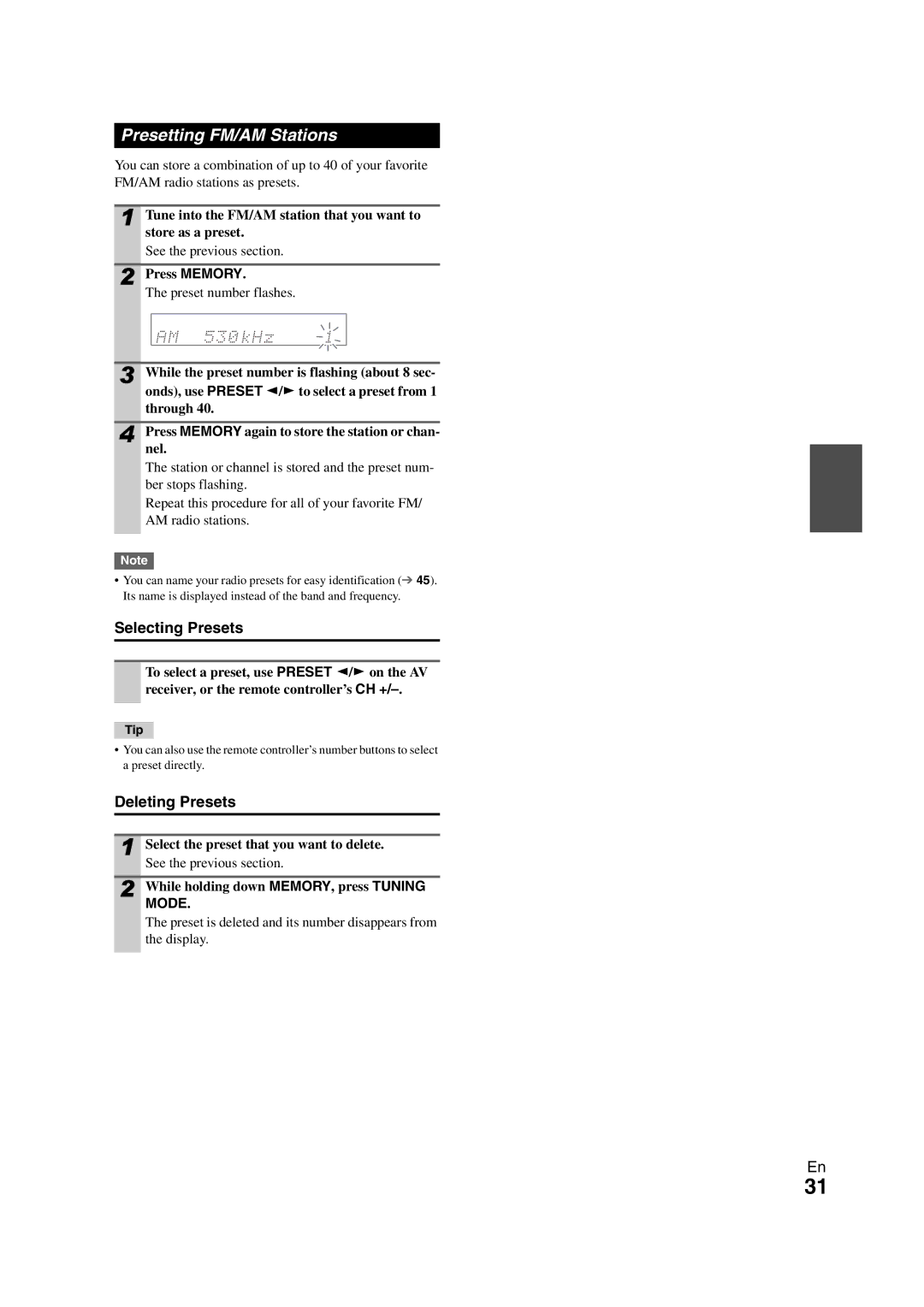HT-S7300
Away from the rear panel or wall, creating a flue-like
Always consider the environmental issues and follow
10 cm 4 at the rear. The rear edge of the shelf or
Board above the apparatus shall be set 10 cm
Precautions
Package Contents
Speaker Precautions
Contents
Features
SKC-680 2-Way Center Speaker
SKW-770 Bass Reflex Powered Subwoofer
SKW-780 Bass Reflex Powered Subwoofer
SKF-680 L/R 2-Way Front Speakers
Front Panel
Hdmi Thru indicator
TUNING, Preset 30 to 31, arrow
Front & Rear Panels
Surr Back or Front High
UREMOTE Control jack
Display
Rear Panel
Subwoofer SKW-770/780
Speaker Package
Front, Center, Surround and Surround Back Speakers
SKF-780 SKC-780
HTP-780 SKF-780, SKC-780, SKR-780, SKB-780
Keyhole slots
Speaker terminals
Controlling the tuner
Remote Controller
Controlling the AV Receiver
Return button
Enjoying Home Theater
About Home Theater
Front, Surround and Surround Back Speakers
Connecting the AV Receiver
Attaching the Speaker Bases
Wall Mounting
SKF-680, SKR-680, SKB-680, SKC-680
Using the Stoppers for a More Stable Platform
Using the Floor Pads for Subwoofer
SKC-780
Number of speakers
Connecting Your Speakers
Speaker Configuration
Speaker Connection Precautions
Screw-type speaker terminals Strip 1/2 to 5/8 12 to 15 mm
Connecting the Speaker Cables
To 5/812 to 15 mm
Hdmi cable
About AV Connections
Connected image with AV components
AV Cables and Jacks
Jack Signal Components Assignable
Connecting Your Components with Hdmi
Audio return channel ARC function
How to record the video
Connecting Your Components
Front Rear
Step
Connecting Onkyo uComponents
System On/Auto Power On
Remote Control
Connecting Antenna
Audio Connection Formats
Signal Selection
Which Connections Should I Use?
Video Connection Formats
Turning On
Turning On/Off the AV Receiver
Turning Off
Displaying Source Information
Selecting the Language Used for the Onscreen Setup Menus
Basic Operations
Playing the Connected Component
Using the Audio and Video Menus
Using the Music Optimizer
Setting the Display Brightness
Using the Sleep Timer
Changing the Input Display
Using Headphones
Using Audyssey 2EQ
Audyssey 2EQ Room Correction Speaker Setup
Enter
Changing the Speaker Settings Manually
Error Messages
Using a Powered Subwoofer
Listening to the Radio
Using the Tuner
Tuning into Radio Stations
Listening to the Radio
Mode
Presetting FM/AM Stations
Selecting Presets
Deleting Presets
AV Recording
Recording
Listening Mode Buttons
Using the Listening Modes
Selecting Listening Modes
Speaker Layout
About Listening Modes
Explanatory Notes
Input Source
Listening Modes
DTS-HD High
Resolution Audio
Dolby Digital Plus *5
Dolby TrueHD
Unplugged
Onkyo-Original DSP Listening Modes
Menu
Advanced Setup
On-screen Setup Menus
Common Procedures in Setup Menu
BD/DVD, VCR/DVR, CBL/SAT, GAME, AUX, TV/CD, Port
Input/Output Assign
Monitor Out
Hdmi Input
Speaker Terminal Assign Front High/Zone2
Speaker Settings
Component Video Input
Digital Audio Input
Speaker Distance
Multiplex/Mono
Audio Adjust
Equalizer Settings
Level Calibration
Theater-Dimensional
Dynamic EQ
Source Setup
Dynamic Volume
Audyssey
Sync
IntelliVolume
Name Edit
Picture Adjust
DTS/DTS-ES/DTS-HD
Listening Mode Preset
Remote ID
Miscellaneous Hardware Setup
Volume Setup
OSD Setup
Hdmi Control Rihd
Power Control
Audio TV Out
Lip Sync
Using the Audio Settings
Lock Setup
Tone Control Settings
Late Night
Audyssey Settings
Speaker Levels
Music Optimizer
Audio Selector
Setting the Incoming Digital Signal Fixed Mode
Audio Selector
Zone
Connecting Zone
Connecting Your Zone 2 Speakers Directly to the AV receiver
Connecting Your Zone 2 Speakers to an Amp in Zone
Controlling Zone 2 from the AV receiver
Setting the Powered Zone Using Zone
Muting Zone
Controlling Zone 2 with the Remote Controller
Adjusting the Volume for Zone
Operating with the remote controller
Onkyo Dock Cable
Connecting an Onkyo Dock
Controlling iPod
Models sold are different depending on the region
UP-A1 Dock
Using the Onkyo Dock
With the RI Control
Controlling Your iPod
RI Dock
Without the RI Control
Available buttons
Looking up for Remote Control Code
Preprogrammed Remote Control Codes
Controlling Other Components
TV/CD
Entering Remote Control Codes
Remote Control Codes for Onkyo Components Connected via u
Remote Mode BD/DVD
Controlling Other Components
Resetting Remote Mode Buttons
Resetting the Remote Controller
You can reset the remote controller to its default settings
CH + Disc +
Components Buttons
Cassettetape deck
TV VOL q/w
There’s no sound, or it’s very quiet
Troubleshooting
Standby indicator flashes red
Can’t turn on the AV receiver
Only the center speaker produces sound
There’s no sound with a certain signal format
About DTS signals
Only the front speakers produce sound
On-screen menus don’t appear
Remote controller doesn’t work
There’s no picture
There’s no picture from a source connected to an Hdmi
Can’t record
AV receiver’s remote controller doesn’t control your iPod
Sound changes when I connect my headphones
There’s no sound
Important Note Regarding Video Playback
Video Attoff default
Video Attenuation
CBL/SAT, GAME, or AUX input
AV receiver
Specifications
Center Speaker SKC-680
Powered Subwoofer SKW-770
1ch Home Theater Speaker Package HTP-680
Front Speaker SKF-680
Dock for iPod UP-A1
1ch Home Theater Speaker Package HTP-780
Supported Audio Formats
About Hdmi
About Copyright Protection
About p-compatible components
Using an RIHD-compatible TV, Player, or Recorder
Operations that can be performed with p connection
Operate with the remote controller
How to connect and setup
Confirm the connecting and setting
Confirm the settings
Component Composite Input 1080p 1080i 720p 480p 480i
Video Resolution Chart
Output
Output
Onkyo Europe Electronics GmbH UK Branch
Onkyo Europe Electronics GmbH

